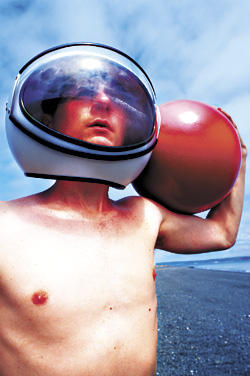I dropped by the Solo Performance Festival at Theatre Off Jackson a couple of weeks ago and was rewarded by two great shows. Andrew Connor’s Boom and Jayson McDonald’s Boatload were both distinguished not only by talent but by that rarest of virtues in solo work: Neither piece was autobiographical. (Am I alone in yearning for some good old-fashioned fiction up on a stage, instead of another public therapy session?)
They created odd worlds populated with unlikely people. Connor’s piece was a sweet satire about a society where bomb making is an artisan’s craft, not an act of terror—Louie, his gentle demolitions expert, makes bombs that cut lawns, paint walls, and eradicate clouds of voracious butterflies. In McDonald’s Boatload, a broke, small-town actor has to first find a thousand dollars, and then decide if he’ll use it to pay the entry fee for a regional audition or for an operation that might save his ailing cat.
Both shows involved the actors leaping to and from a large cast of characters who were so engaging that I found myself waiting eagerly for some of them to show up again—the crotchety old people in Connor’s play who sweetly croon insults at each other, or the high-maintenance girlfriend of McDonald’s actor who repeatedly calls his cell phone midperformance, then shows up to warn him, “You’d better not put me in your play, because if you do you’ll make me look like I’m crazy, when you’re the one who’s CRAZY!”
But the most remarkable moment came during Boom when, in the midst of a conversation between Louie and his niece Rosa where he’s asking why she blew up the school fair’s Tilt-A-Whirl, Connor suddenly stopped and gave a small sigh. Then he stood up, mimed picking up the scene he’d just done as if it was a box filled with defective parts, and tossed it aside. Then he began the scene again. He got to roughly the same spot, and flubbed a line. He gave a small laugh, picked up that scene, and tossed it aside. Then, without even a deep breath, he ran the scene a third time, and this time continued strong to the end.
When a performer messes up in theater, the audience rarely notices. There’s an unspoken agreement among a company that if an actor flubs a line or (even worse) loses his place, everyone jumps in and does whatever they can to cover. Yes, I’ve seen shows where catastrophes stopped the show, where set pieces emerged too early or jammed in place, calling for a quick curtain and frantic stage managers. Once, an actress friend took a bad fall midshow and broke her leg, then, in a triumph of will, stuck on an ice pack and continued her performance seated.
But other mishaps and mistakes are invisible—except to the actor. When I talked to Connor afterward, I could practically hear his grimace through the phone. “Tuesday night! That’s the only time that’s really happened. I made a mistake and felt like I couldn’t go on.” (For the record, the little girl was explaining why she blew up the Tilt-A-Whirl but instead Connor called it the “space port,” which is where the girl’s uncle works.) “So I needed to make something out of it.” That choice came from work with his partner, Mike Mathieu, the other half of the justifiably loved sketch duo the Cody Rivers Show. “When we started out, we were such perfectionists. We’d beat ourselves up if we made the slightest mistake. But we decided in most cases it’s best to notice it and play it up. Might as well have some fun with it, right?”
I asked McDonald about his experience with screwing up. “You start sweating. It’s a really specific kind of sweat, very clammy and potent, and the soles of your feet become enormously damp, and then…you just soldier on. You barrel through the uncomfortable pause that is three seconds tops and feels like three hours, and you come out the other end.” He recalled runs of his earlier show Giant Invisible Robot where, “I skipped whole scenes, and there’s a part of your mind that’s thinking, how can I go back?”
But he can’t go back, of course, and neither can the audience, which is the sad and wonderful truth about theater. There’s no chance to fix things in post, no editing suite where things can be snipped out until no mistakes remain. Fortunately for both McDonald and Connor, each has a strong background in sketch comedy, which rewards improvisation and a quick wit. “You think a little faster when you’ve been doing sketch for a while,” says McDonald. And thinking fast is a benefit when you’re trying to salvage a moment onstage.
When I talked to SPF’s organizer in chief, Keira McDonald, she likened Connor’s stumble and recovery to the performance of figure skater Sasha Cohen at the 2006 Olympics, when she suffered two falls at the beginning of her routine, then went on to win the silver with a flawless piece. While both actors would probably laugh at the comparison, I think it’s a fair one. Like Cohen, they work alone, with no opportunity to toss the focus to another actor or apologize to the audience. You just get up and keep going, and trust that while you can’t erase the mistake, you can give a performance that renders it insignificant.








